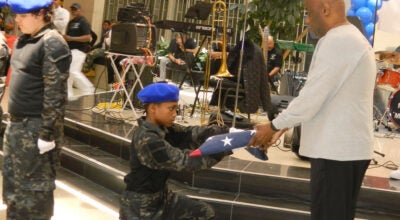City Council raises tax, water-sewer rates but less than expected
Published 12:00 am Tuesday, June 24, 2014
SALISBURY — Five days after the city manager and public information officer abruptly left their jobs, Salisbury City Council passed a budget quickly and easily with only a passing comment about the upheaval.
Council members on Monday voted unanimously to raise the tax rate 1.95 cents, water-sewer rate 2.45 percent and monthly garbage fee $1, as well as increase Fibrant rates for TV customers only.
The increases take effect July 1, the first day of the new fiscal year. The city’s new property tax rate will be 65.69 cents per $100 of valuation.
The tax and water-sewer rate hikes were less than expected. Former City Manager Doug Paris had proposed going up by 2.9 cents on the property tax rate and 2.9 percent on the water-sewer rate.
Paris left his job last week after a five-hour City Council closed session. Elaney Hasselmann, the city’s communications director, left the next day. Paris and City Council members said they came to a mutual agreement to end his contract, but no one is saying why. Hasselmann said she quit because Paris was leaving.
Both departures were effective immediately.
Interim City Manager John Sofley, the city’s long-time finance chief, led Monday’s budget workshop. The only public mention of Paris came during a discussion of the Parks and Recreation Department, when Councilman Brian Miller called Paris’ absence “the elephant in the room.”
“A week’s time is not enough to know how this is all going to shake out,” Miller said.
Miller’s comments came as several City Council members asked about a budget decrease for parks and recreation. Paris had recommended $2.56 million for the department, down from $2.6 million in the current fiscal year and $3.34 million the previous year. The department had requested $2.84 million for the coming year.
Paris in May 2013 fired the parks and recreation director and program manager after he said staff discovered the department has been inflating participant numbers for years. At the time, Paris said the job cuts would save $240,000, which would go to frontline parks programming and services.
Mayor Paul Woodson on Monday asked why the parks and recreation budget had decreased and expressed concern about grounds maintenance. Assistant City Manager Zach Kyle, who has overseen the department since Gail Elder White was fired, said he has not eliminated any maintenance positions.
Miller said he wants to see an overall plan for parks and recreation, which is an accredited department, by February when City Council holds its annual strategic planning retreat.
“Let’s figure out what we want to be when we grow up in that area of the city,” Miller said.
Kyle said city staff have a plan for parks and recreation that they will share.
The budget workshop, which was scheduled to continue today, was over in just a few hours largely, Woodson said, because Sofley met individually last week with nearly every City Council member after Paris left. Councilman Pete Kennedy was on vacation.
Sofley said he wanted to hear if City Council members had problems with the proposed budget or questions and felt he could accomplish more with each member individually rather than the entire group.
A quorum of the council constitutes a public meeting.
Council members did have a public back-and-forth with Sofley and several other staff members Monday for about 90 minutes. Council members listed several projects they wanted included in the budget and asked staff if they could find a way to lower the proposed tax hike from 2.9 cents to 1.95 cents.
Sofley and his staff huddled and came up with several cuts and additions, which council members unanimously approved. The 2014-15 budget totals $70,571,061, including a general fund budget of $36,255,871 and water-sewer budget of $22,707,337.
Changes to the budget that made the tax and water-sewer rate increases easier to swallow include:
• Added $20,000 to projected sales tax receipts. Salisbury’s recent sales tax revenues have been higher than expected, Sofley said, and the trend should continue.
• Added $45,000 to projected utilities franchise tax revenues. The state levies this tax on all utilities other than water-sewer, then distributes a portion back to cities each quarter. The city’s most recent payment from the state was higher than expected, Sofley said.
• Cut street light funding by $90,582. Street lights have been a hot topic recently, with advocates for the West End and Livingstone College asking for more illumination to prevent crime.
Paris had recommended $692,386 — $120,000 more than the current year — for street lights throughout the city, earmarking $40,000 for the West End. But Sofley said when he consulted Vickie Edleman, the city’s street light specialist, he learned that Duke Energy is behind and would not be able to install street lights worth $692,386 in the coming year.
The city designs street lights, and Duke installs them.
The new street light budget of $601,804 is still $33,500 more than the current year, Sofley said.
Both Sofley and Woodson said it is too early to say whether the West End will get additional street lights in the coming year. Several other requests are in front of the West End’s, but Woodson said he asked Edleman to work with the neighborhood to complete the required petitions to get the ball rolling.
• Cut $45,000 from street resurfacing, although the $368,000 budget is still 14 percent more than the current year, Sofley said.
• Cut $21,000 on a floor replacement project that was completed this year.
• Cut $24,900 from the salary and benefits package for the GIS coordinator position. Kathryn Clifton left the job to take a position with the town of Spencer, and Sofley said he expects to hire a replacement at a lower salary.
• Cut $33,000 by putting off a street resurfacing survey.
• Cut $20,000 in expected grant money and $35,000 in costs related to applying for historic district status for the Chestnut Hill neighborhood.
The complicated application process will continue, but city staff said they could not meet the deadline for this grant cycle. Sofley said he would move the grant expense and proceeds to the following year.
• Restored $20,000 for the Innes Street grant program.
• For the first time, allocated $4,500 for the Dixonville cemetery memorial project.
• Restored $4,500 for anti-gang efforts.
• For the first time, funded Communities in Schools at $5,000.
• Added $2,000 for Pops at the Post.
• Doubled funding for the Salisbury Youth Council to $10,000 since membership has gone from 12 to 30 children.
• Eliminated two vacant positions in Salisbury-Rowan Utilities to save $88,092 and increase the rate by 2.45 percent instead of 2.9 percent.
Woodson said the tax rate would have remained the same if not for the loss of $659,000 caused by the expiration of “transitional hold harmless” payments that the state has been making to a group of about 100 cities in North Carolina, including Salisbury.
The allocations were enacted by the legislature in 2002 to help communities make up the loss of shared revenue from a tax on business inventory, which had been repealed.
The new budget includes several projects that drew supporters to the budget public hearing: $279,000 to widen Newsome Road and build the city’s first bike lanes, $59,730 for sidewalks on Bringle Ferry Road and about $40,000 to expand public bus service to Wallace Commons and medical offices on Julian Road. The state will pay 80 percent of the total cost for the Newsome Road and Bringle Ferry Road projects.
Read more about the budget, as well as Paris and Hasselmann’s departures, in Wednesday’s Post.
Contact reporter Emily Ford at 704-797-4264.




